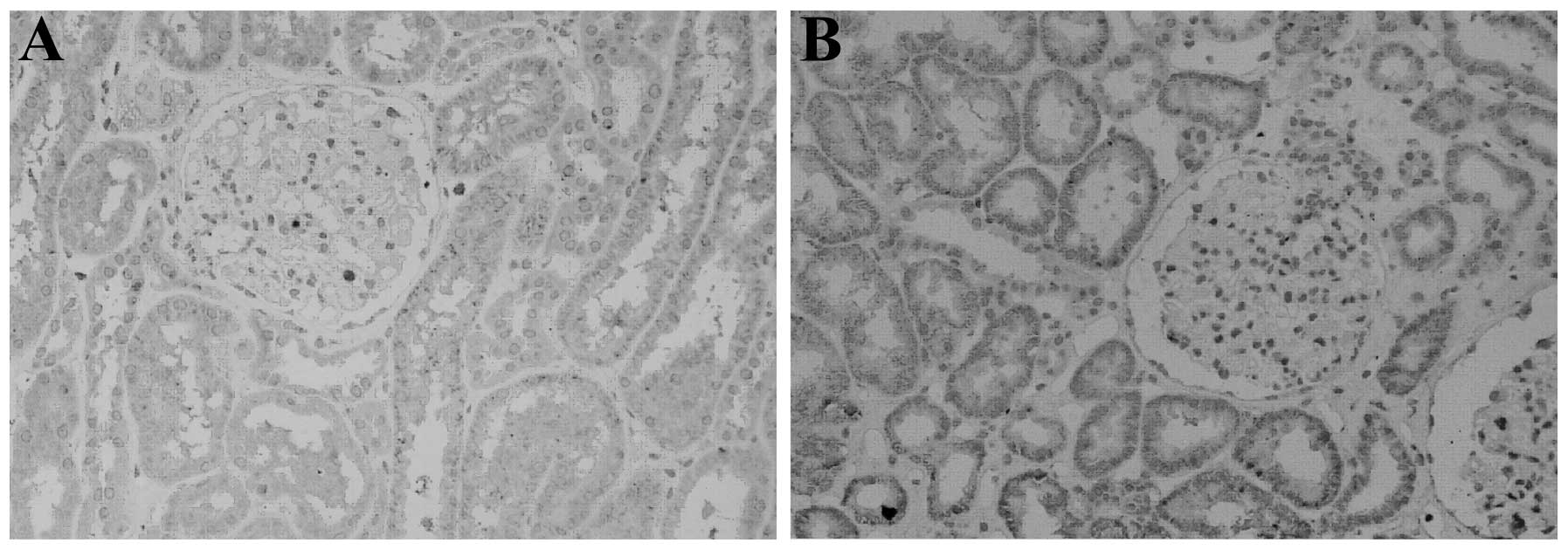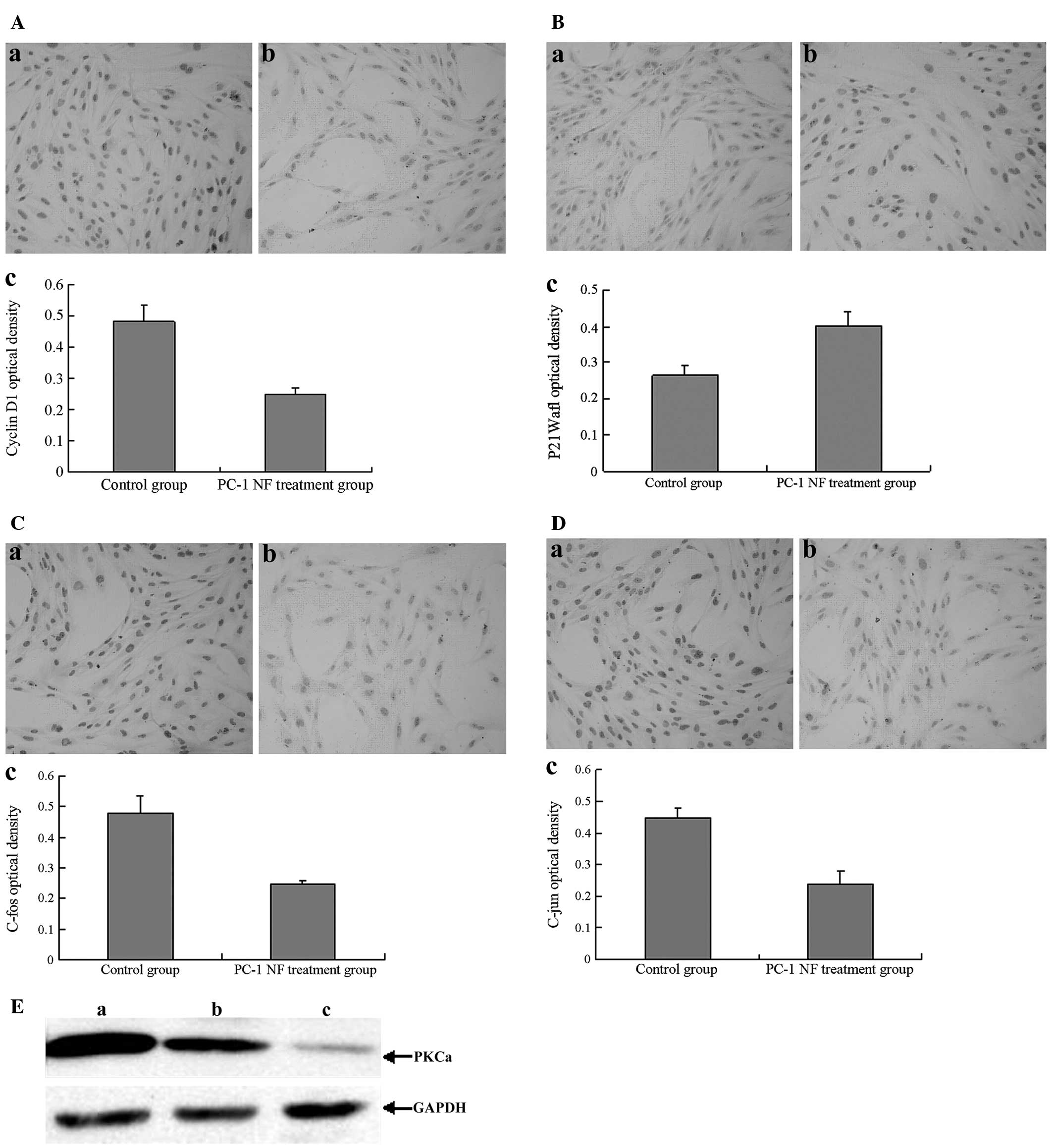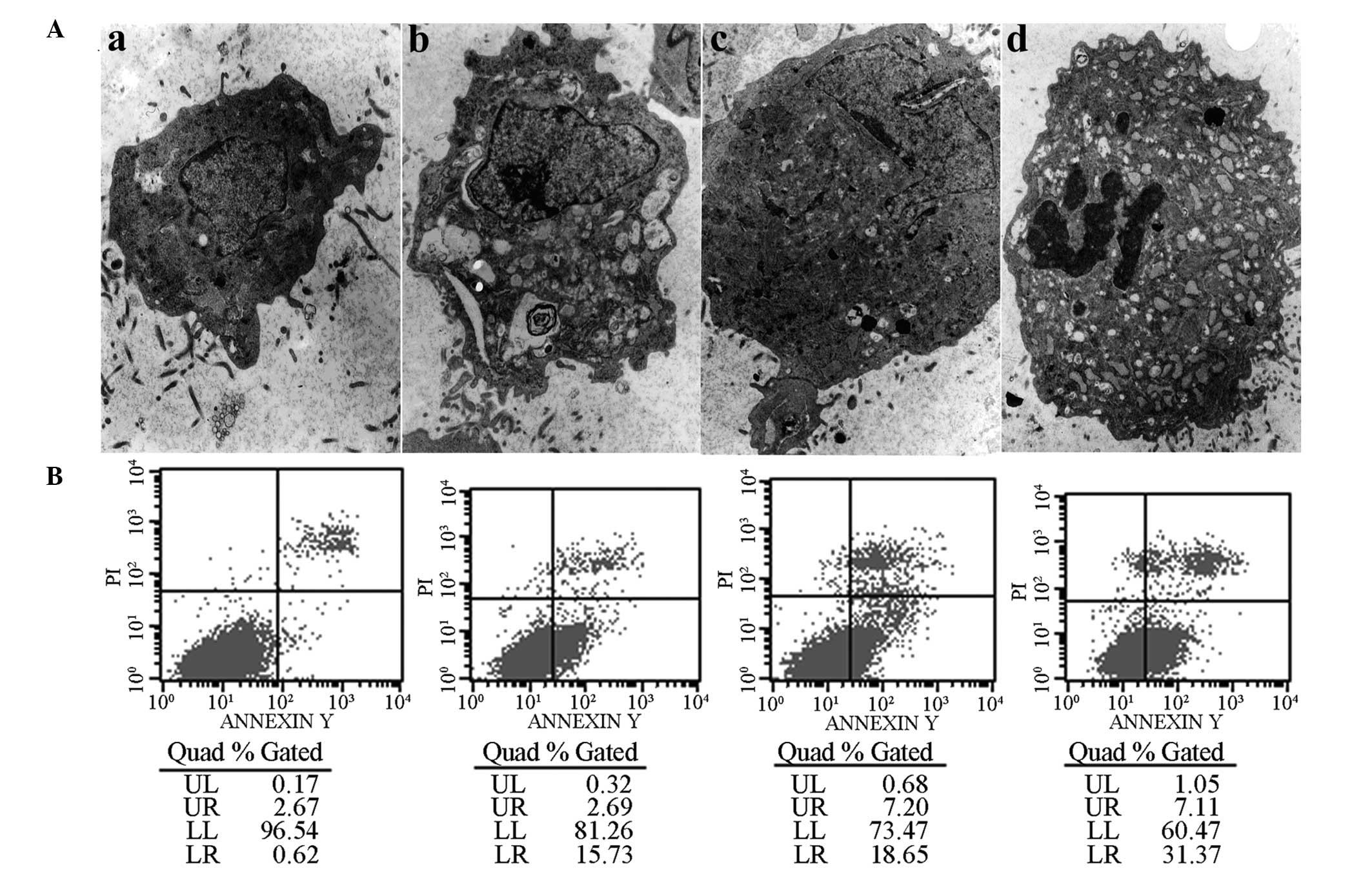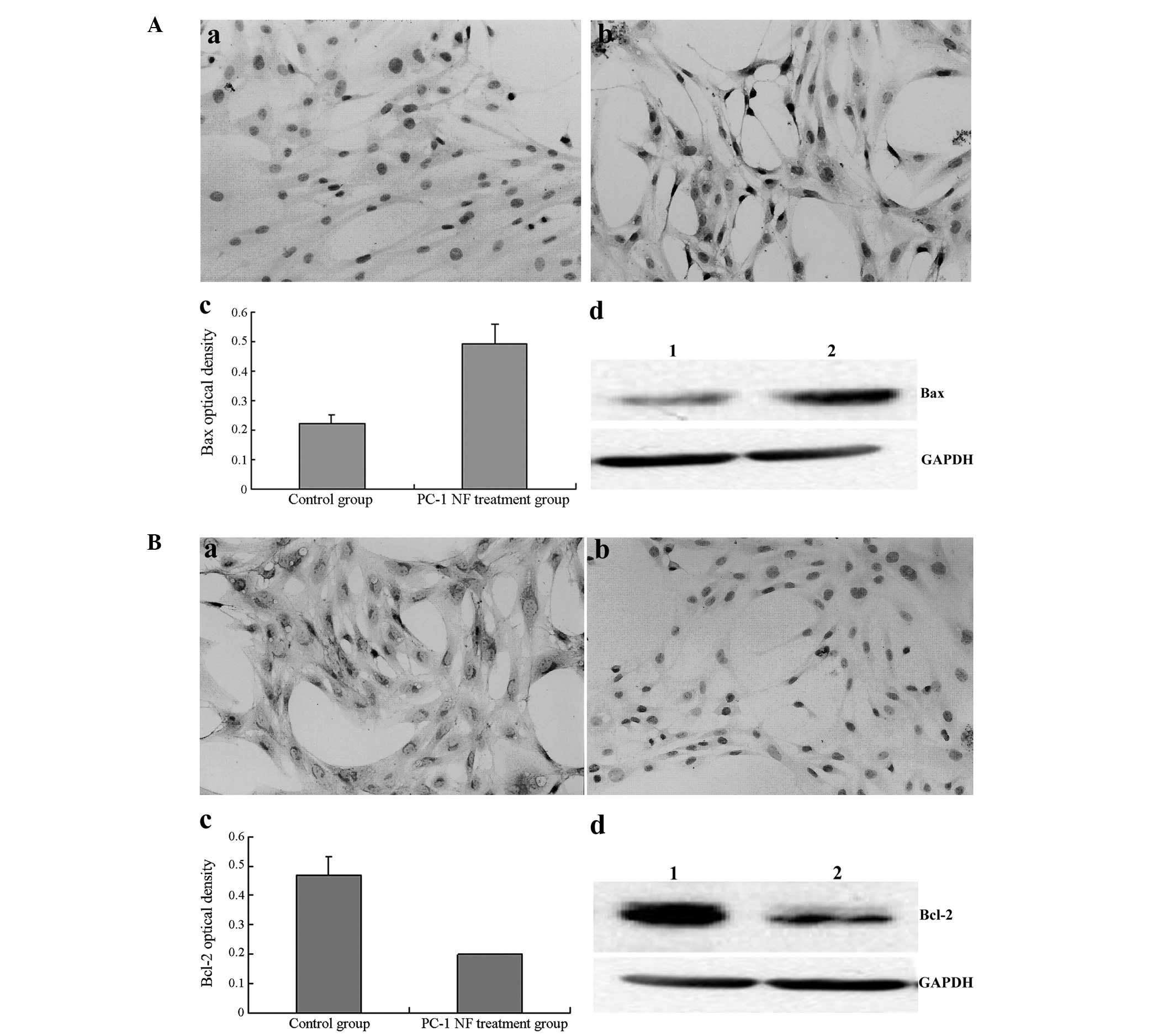|
1
|
Sethi S and Fervenza FC:
Membranoproliferative glomerulonephritis: pathogenetic
heterogeneity and proposal for a new classification. Semin Nephrol.
31:341–348. 2011. View Article : Google Scholar
|
|
2
|
Chapin HC and Caplan MJ: The cell biology
of polycystic kidney disease. J Cell Biol. 191:701–710. 2010.
View Article : Google Scholar : PubMed/NCBI
|
|
3
|
Harris PC and Torres VE: Polycystic kidney
disease. Annu Rev Med. 60:321–337. 2009. View Article : Google Scholar
|
|
4
|
Zhao HD, Mei CL, Li L, et al: Preparation
and characterization of monoclonal antibody against N-terminal
domain of polycystin 1. Xi Bao Yu Fen Zi Mian Yi Xue Za Zhi.
20:186–190. 2004.(In Chinese).
|
|
5
|
Zhao HD, Sun TM, Wang WJ, et al:
Evaluation of polycystin-1 N-terminal peptide on the proliferation
and apoptosis of cystic lining epithilial cells in human ADPKD.
Chin J Nephrol. 21:664–668. 2005.(In Chinese).
|
|
6
|
Zheng R, Zhang Z, Lv X, et al:
Polycystin-1 induced apoptosis and cell cycle arrest in G0/G1 phase
in cancer cells. Cell Biol Int. 32:427–435. 2008. View Article : Google Scholar : PubMed/NCBI
|
|
7
|
Mei CL, Zhang LM and Chen L: The
establishment of rat mesangial cell line. Chin J Nephrol Dial
Transplant. 5:90–92. 1996.(In Chinese).
|
|
8
|
Suana AJ, Tuffin G, Frey BM, et al: Single
application of low dose mycophenolate-mofetil-OX7-immunoliposomes
ameliorates experimental mesangial proliferative
glomerulonephritis. J Pharmacol Exp Ther. 337:411–422. 2011.
View Article : Google Scholar
|
|
9
|
Boletta A, Qian F, Onuchic LF, et al:
Polycystin-1, the gene product of PKD1, induces resistance to
apoptosis and spontaneous tubulogenesis in MDCK cells. Mol Cell.
6:1267–1273. 2000. View Article : Google Scholar : PubMed/NCBI
|
|
10
|
Takahashi H, Oishi Y, Chuang SS and Morii
S: Effects of tissue fixation and processing on proliferating cell
nuclear antigen (PCNA) immunohistochemistry. Acta Pathol Jpn.
42:621–623. 1992.PubMed/NCBI
|
|
11
|
Wang J, Wang Q, Cui Y, et al: Knockdown of
cyclin D1 inhibits proliferation, induces apoptosis, and attenuates
the invasive capacity of human glioblastoma cells. J Neurooncol.
106:473–484. 2012. View Article : Google Scholar : PubMed/NCBI
|
|
12
|
Wei J, Zhao J, Long M, et al: p21WAF1/CIP1
gene transcriptional activation exerts cell growth inhibition and
enhances chemosensitivity to cisplatin in lung carcinoma cell. BMC
Cancer. 10:6322010. View Article : Google Scholar : PubMed/NCBI
|
|
13
|
Bhunia AK, Piontek K, Boletta A, et al:
PKD1 induces p21(waf1) and regulation of the cell cycle via direct
activation of the JAK-STAT signaling pathway in a process requiring
PKD2. Cell. 109:157–168. 2002. View Article : Google Scholar : PubMed/NCBI
|
|
14
|
Qiao X, Pham DN, Luo H and Wu J: Ran
overexpression leads to diminished T cell responses and selectively
modulates nuclear levels of c-Jun and c-Fos. J Biol Chem.
285:5488–5496. 2010. View Article : Google Scholar : PubMed/NCBI
|
|
15
|
Lee SY, Yoon J, Lee HS, et al: The
function of heterodimeric AP-1 comprised of c-Jun and c-Fos in
activin mediated Spemann organizer gene expression. PLoS One.
6:e217962011. View Article : Google Scholar : PubMed/NCBI
|
|
16
|
Hwang YP, Yun HJ, Kim HG, Han EH, Lee GW
and Jeong HG: Suppression of PMA-induced tumor cell invasion by
dihydroartemisinin via inhibition of PKCalpha/Raf/MAPKs and
NF-kappaB/AP-1-dependent mechanisms. Biochem Pharmacol.
79:1714–1726. 2010. View Article : Google Scholar : PubMed/NCBI
|
|
17
|
Francis H, Onori P, Gaudio E, et al: H3
histamine receptor-mediated activation of protein kinase Calpha
inhibits the growth of cholangiocarcinoma in vitro and in vivo. Mol
Cancer Res. 7:1704–1713. 2009. View Article : Google Scholar : PubMed/NCBI
|
|
18
|
Uğuz A, Gönlüşen G, Ergin M and Tuncer I:
Expression of Fas, Bcl-2 and p53 molecules in glomerulonephritis
and their correlations with clinical and laboratory findings.
Nephrology (Carlton). 10:311–316. 2005.PubMed/NCBI
|
|
19
|
Fuzio P, Ditonno P, Lucarelli G, et al:
Androgen deprivation therapy affects BCL-2 expression in human
prostate cancer. Int J Oncol. 39:1233–1242. 2011.PubMed/NCBI
|
|
20
|
Shinagawa A, Yoshida Y, Kurokawa T, et al:
The potent peptide antagonist to angiogenesis, C16Y, and cisplatin
act synergistically in the down-regulation of the Bcl-2/Bax ratio
and the induction of apoptosis in human ovarian cancer cells. Int J
Oncol. 39:1359–1364. 2011.
|
|
21
|
Stamenkovic I: Extracellular matrix
remodeling: the role of metalloproteinases. J Pathol. 200:448–464.
2003. View Article : Google Scholar : PubMed/NCBI
|
|
22
|
Selvais C, Gaide Chevronnay HP, Lemoine P,
et al: Metalloproteinase-dependent shedding of low-density
lipoprotein receptor-related protein-1 ectodomain decreases
endocytic clearance of endometrial matrix metalloproteinase-2 and
-9 at menstruation. Endocrinology. 150:3792–3799. 2009. View Article : Google Scholar
|
|
23
|
Bauvois B, Mothu N, Nguyen J, Nguyen-Khoa
T, Nöel LH and Jungers P: Specific changes in plasma concentrations
of matrix metalloproteinase-2 and -9, TIMP-1 and TGF-beta1 in
patients with distinct types of primary glomerulonephritis. Nephrol
Dial Transplant. 22:1115–1122. 2007. View Article : Google Scholar
|
|
24
|
Jacob-Ferreira AL, Lacchini R, Gerlach RF,
Passos CJ, Barbosa F Jr and Tanus-Santos JE: A common matrix
metalloproteinase (MMP)-2 polymorphism affects plasma MMP-2 levels
in subjects environmentally exposed to mercury. Sci Total Environ.
409:4242–4246. 2011. View Article : Google Scholar
|
|
25
|
Davies M, Martin J, Thomas GJ and Lovett
DH: Proteinases and glomerular matrix turnover. Kidney Int.
41:671–678. 1992. View Article : Google Scholar : PubMed/NCBI
|



















